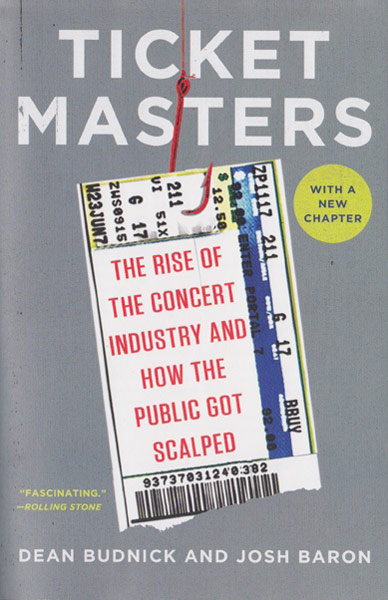
by Dean Budnick and Josh Baron
Plume
Anyone who has ever purchased concert tickets has no doubt experienced the frustration that comes with such an experience. With the likelihood of getting good seats—or seats at all—often seeming as feasible as winning the lottery and the price of such seats increasingly costing as much as a month’s rent, the process of securing tickets to see your favorite band is on par with passing a kidney stone in terms of pleasantness. The thought of camping out overnight to be first in line now seems quaint and romantic compared with dealing with the electronic queue of online purchasing. Of course, then there are the always surprising service and “convenience” charges that are tacked on, fees that are nearly as much as the tickets themselves in some cases and seem to bear no relationship to the “service” rendered. But such costs almost seem reasonable when compared with the prices you’ll pay if you buy from a broker, who somehow managed to get a plethora of great seats supposedly using the same online system on which you never pulled up a single available ticket.
So how the hell did things get like this? As you more than likely know, Ticketmaster, despite what Congress may say to the contrary, has long held a monopoly on the ticket business. Entering the computerized ticket business in the ’70s, the company eventually eclipsed and absorbed its competition, Ticketron, who, being one of the first companies providing computerized ticketing services, had long been the leader in the market. But these two organizations are just a couple of a handful of significant innovators in the field, and ticketing for events via computers dates back to the ’60s. Dating even further back, however, is the concept of service charges by ticketing agencies, while brokers have been looking to turn a buck selling tickets at a mark-up even longer, with Charles Dickens having complained about such scavengers during an American reading tour.
There is perhaps not a greater volume on the history of the computerized ticket business than Ticket Masters: The Rise of the Concert Industry and How the Public Got Scalped by Relix editors Dean Budnick and Josh Baron. Originally published in 2011, the book has recently been reprinted with a new chapter bringing the story up to date.
As first glance, the history of tickets being bought and sold would not seem to make for an interesting read, but Budnick and Baron’s exhaustively researched book is unendingly fascinating. They interviewed all the important players in the industry, which surprisingly had its share of colorful characters (usually on the business or music side of things, however, not computer programming). The book also shows that the concept of a start-up is not new to the 21st century, as nearly all the companies that entered the fray of the ticketing business were launched with little financial backing at first. Moreover, it’s interesting to see how the connections between this industry and the advents in computer technology, and on the other side, the rise of rock & roll. The book may not offer much comfort to the ticket buyer, other than to know that, yes, those charges are arbitrary and that music fans are indeed being gauged, but it is truly an eye-opener in regards to how the business has turned into the monster it has become.
Stephen Slaybaugh
Seeing the Light: Inside The Velvet Underground
Record Store Day Picks
The Swell Season
Swervedriver Live Review
The Wedding Present Live Review
No More Free Kicks
The Lemonheads Live Review
Public Image Limited, Live at Rockpalast
Everyday Sunshine: The Story of Fishbone
Fela!
The Rock of Art
The Book of Drugs
The Gories Live Review
Jeff Mangum and Califone Live Reviews
